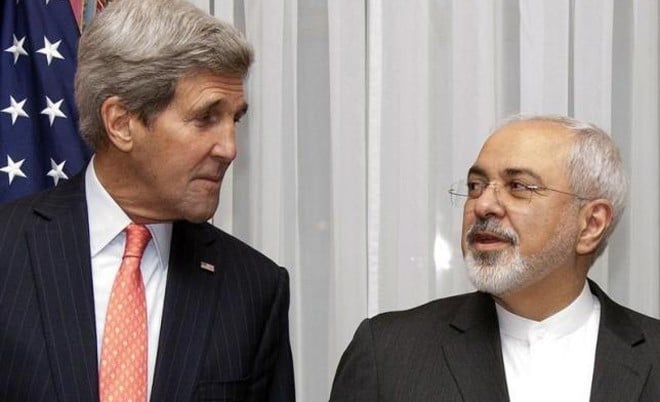
President Obama is sticking to his guns to make the Iran nuclear deal a success and he hopes it could last 50 years and beyond

It seems that history has come full circle, only this time with greater impact and expansion.
Almost 50 years ago, man set foot on the moon. Today, the world can see vivid images of Pluto. Almost 50 years ago, President Kennedy urged a discussion between the United States and the Soviet Union, which led to efforts to restrict the spread of nuclear weapons. Today, the US finalised an almost similar deal with Iran.
President Kennedy said: "Let us never negotiate out of fear, but let us never fear to negotiate."
President Obama followed suit and -- after two years of intense and continuous negotiations -- reached a deal that Iran will not develop a nuclear weapon, or at the very least will slow down progress to that end. The good deal or the historic deal, as it is referred to now, surely has put off any immediate excuse of a new bloody war in the Middle East.
The president cheerfully described the agreement to the world. "Because of this deal, Iran will not produce the highly enriched uranium and weapons-grade plutonium that form the raw materials necessary for a nuclear bomb. Because of this deal, Iran will remove two-thirds of its installed centrifuges and store them under constant international supervision. Because of this deal, that stockpile will be reduced to a fraction of what would be required for a single weapon. This stockpile limitation will last for 15 years. Because of this deal, we will, for the first time, be in a position to verify all these commitments. Inspectors will have 24/7 access to Iran’s key nuclear facilities. Some of these transparency measures will be in place for 25 years."
Iran, in return, will receive relief from the sanctions put in place by the US and sanctions imposed by the United Nations Security Council. Over the course of the next decade, additional sanctions will be lifted, including five years for restrictions related to arms, and eight years for restrictions related to ballistic missiles. In case of any violation all of the sanctions will snap back into place.
Just a week after the announcement of the deal, the UNSC unanimously adopted a resolution establishing a monitoring system for Iran’s nuclear programme and considering the "eventual removal" of all nuclear-related sanctions. The Council endorsed the Joint Comprehensive Plan of Action (JCPOA), which is described as the "culmination" of diplomatic efforts by the so-called E-3+3 -- China, France, Germany, Russia, the U.K, and the US -- and Iran, "to reach a comprehensive, long-term and proper solution to nuclear issue." The JCPOA will come into effect in three months.
The Security Council also decided that "not the date ten years after the JCPOA Adoption Day," as defined in the agreement, "all the provisions of this resolution shall be terminated," and none of the previous resolutions "shall be applied."
Meanwhile, the critics of the deal -- especially in the Congress -- vowed to review the details. Chairman Ed Royce and Ranking member Eliot Engel of the House Foreign Relations Committee reacted saying, "We are disappointed that the UNSC passed a resolution on Iran, …before Congress was able to fully review and act on this agreement. We are also greatly concerned that the resolution lifts restrictions on Iran’s ballistic missiles in eight years and conventional arms in five years. Regardless of this outcome, Congress will continue to play its role."
While the President offered to discuss details of the deal, he also reminded Congress that such deals are not made with friends. He warned, "I am confident that this deal will meet the national security interest of the United States and our allies. So I will veto any legislation that prevents the successful implementation of this deal."
This clear resolute attitude was not just for the opponents of this deal in the Congress but also for countries like Saudi Arabia and Israel. Both countries reacted sharply and paid less heed when President Obama had invited their representatives to Camp David last month to discuss the pros and cons. Obama eventually asked all opponents to offer any alternative to this deal -- if there was any.
Also read: Dividends in the pipeline
Consider what happens in a world without this deal, he said, adding, "Without this deal, there is no scenario where the world joins us in sanctioning Iran until it completely dismantles its nuclear programme. The world would not support an effort to permanently sanction Iran into submission. Without this deal, there would be no agreed upon limitation for the Iranian nuclear programme. Iran could produce, operate and test more and more centrifuges. In other words, no deal means no lasting constraints on Iran’s nuclear program."
"Without this deal," he further pointed out, "other countries in the region would feel compelled to pursue their own nuclear programmes, threatening a nuclear arms race. It would also present the US with fewer and less effective options to prevent Iran from obtaining a nuclear weapon."
The US administration takes pride in choosing diplomacy over any chance of war. At the same time, it appears both stern and appeasing to deal-critics, saying that the deal will not resolve all differences with Iran. "Put simply, no deal means a greater chance of more war in the Middle East," Obama remarked.
The US administration believes that in a worst case scenario, if Iran violates the deal, the same options of war or military force will be available to any US President in the future. The "good deal", no matter how controversial, has become Obama’s legacy. He’s sticking to his guns to make it a success, and he hopes it could last 50 years and beyond.